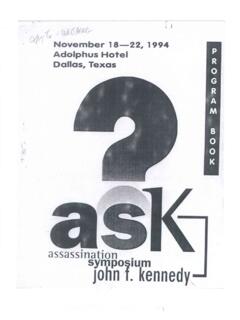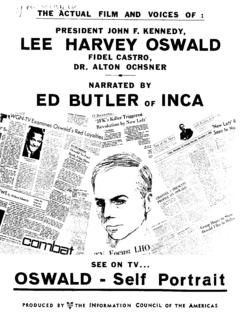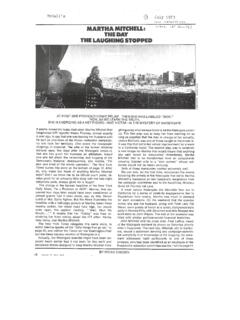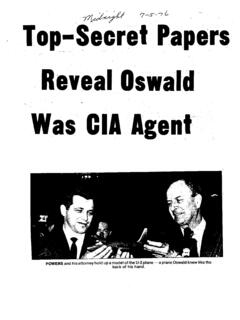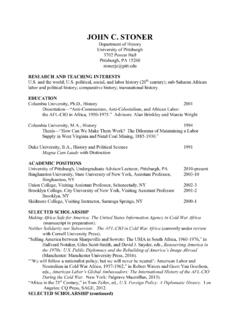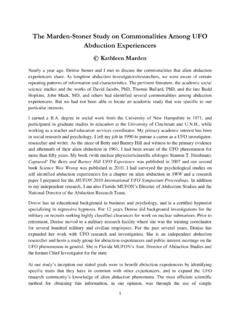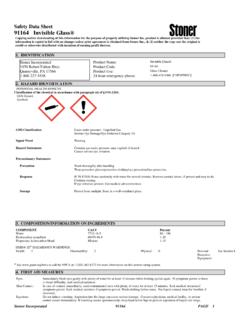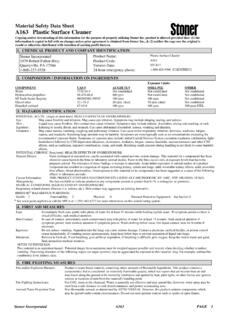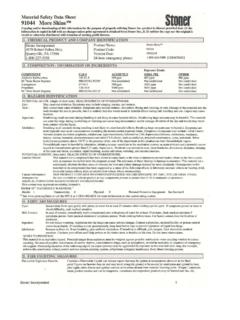Transcription of TELE•SEX - The Harold Weisberg Archive
1 CHIC C. In Atlanta "the candidate of love" tans the flames of racial discord It was at one of those candidate forums on the rubber-chicken circuit a decade ago that the stubby little man with the limp and the mean squinty eyes made the Georgia public take notice of him. He did it with a piece of psy-chological brutality reminiscent of the old country joke in which you get a mule's atten-tion by slamming the animal between the eyes with a plank. There's something in Georgia's political air that causes the state's election ballots to be flooded with candidates, many of them not even worth dignifying as long shots.
2 So it was in 1970, with no fewer than 10 contenders running for governor. But only two of them really mattered. They were former Governor Carl Sanders and a onetime state senator from Sumter County named Jimmy Carter. Neither Sanders nor Carter's stand-in, a young University of Georgia graduate named Hamilton Jordan, captured the headlines of the news sto-ries filed on the West End Kiwanis Club's forum. The major news belonged to two of those "mi-nor" candidates. One was a Negro ("black" was not commonly used in Georgia newspapers at the time) lawyer named King, who spoke with a preacher's voice and had the diction and vocabu-lary of an Oxford don.
3 And the other was Jesse Benjamin Stoner, Jr., self-styled "white racist." With a genius for the mocking, outrageous touch, Stoner touted himself as "the candidate of love love of the white race." King couldn't win, of course, but he received ample attention from a 56 APRIL 1980 press intrigued by the first candidacy of a black for statewide office since Reconstruction. Stoner, likewise an attorney, was little known. But the press, the FBI and the Anti-Defamation League, three groups ever watchful for budding Nazism, all had thick files on Stoner because of his role as head of a small radill'and anti-Semitic or-ganization called the National States Rights Party.
4 It may have been a tasteless joke or an honest oversight; only the guilty know for sure. Either way, it turned out that King and Stoner were seated together at the head table. While the other candidates tucked into the luncheon that pre-ceded the politicking, Stoner took not a bite. Well aware that reporters and some of the club mem-bers had noticed, Stoner caressed his double chin -and smiled slyly, as if harboring some delightful secret. When his turn came, Stoner disclosed his secret. "I don't eat with niggers." His hosts blanched. "Never have." Then he turned to politics. " King isn't likely to get too many nigger votes," said the can-didate of love.
5 "The nigger vote is owned by the bankers, the Chamber of Commerce and the Jews, and they deliver it to the candidate of their choice." That candidate, Stoner said, was Sanders. The absent Carter, then running a conservative, segregationist-tinged campaign that would win him the governorship and a springboard to the White House, was, in Stoner's words, "no con-servative at all, but the hippies' candidate." This was presumably true be-cause Carter campaigned on Georgia campuses. Stoner's finish in the Muslrated by Bob Gleason Terry 1970 Democratic primary, his debut in Georgia politics, never brought him close to winning.
6 But editorial writers, columnists and the clergy were appalled by his 17,663 votes, good enough for fourth place behind King. In subse-quent races for statewide office he skipped only 1976 Stoner more than tripled his vote in his best showing. Stoner's ostentatious cruelty at that Kiwanis luncheon was nothing less than typical. During that same primary cam-paign he scornfully called a fellow also-ran, a Georgia physician who made no bones about being a segregationist, a "veterinarian" for treating black pa-tients. Stoner has publicly called Adolf Hitler a "moderate," referred to Jews as the "children of the devil" and branded former Atlanta Mayor Sam Massell a "Christ-killing Jew.
7 " In Stoner's mouth the assassinated Nobel Prize winner becomes "Martin Lucifer Coon" especially if the televi sion cameras are rolling. At a televised political forum during the 1978 elec-tions, when Stoner was again running for governor, the moderator warned him he would be cut off if he continued to say "nigger" on the air. Undaunted, Stoner switched to "chocolate drop." Stoner's words make mere segrega-tionists cringe. Former Georgia Gover-nor Lester Maddox, himself no slouch at racial invective, walked off a platform during a Stoner diatribe in the 1970 campaign. Most of the other candidates did likewise.
8 "It got to be nauseating," Maddox told reporters. Sure he was a segregationist, but there was no personal hatred in it. "People can't help what they were born," Maddox explained. Former Georgia Governor Marvin Griffin, as staunch a partisan of racial purity as he is a charming storyteller, told the Atlanta Press Club that Stoner's racism reminded him of the tale about the drunk aboard the sinking Titanic: "I ordered ice, but this is ridiculous." The pudgy, crewcut lawyer is best known for the vitriol of his campaign style, but politics may be just the tip of the iceberg. Stoner is a suspect in a num-ber of civil-rights bombings the dynamiting of synagogues and black churches that punctuated a tortured era.
9 He has waged a two-year fight against extradition to Alabama for prosecution in the 1958 bombing of a Birmingham church that once served as a civil-rights field headquarters. Ironically, the bomb exploded harmlessly in a parking lot. William J. Baxley, the former attor-ney general of Alabama who brought that bombing indictment against Stoner, admits his investigators consid-ered the Georgia white supremacist 58 APRIL 1980 their main suspect in the 1963 bombing of Birmingham's Sixteenth Street Bap-tist Church in which four young Sun-day-school girls were killed. Baxley con-ceded that Alabama investigators fol-lowed a blind alley for nearly two years before deciding there wasn't enough evi-dence to pin the bombing on Stoner.
10 The House of Representatives subcommittee investigating the murder of Dr. Martin Luther King, Jr., ques-tioned Stoner about possible ties to the King assassination the fact that he briefly represented James Earl Ray after the murder, and Stoner's long and con-tinuing relationship with Ray's younger brother, Jerry. The FBI, after checking Stoner's whereabouts on April 4, 1968 (he was speaking at a white-supremacy rally in Meridian, Mississippi), dropped him as a suspect. Eleven years later the sub-committee determined that, despite "He will tell only his birthplace and the fact that he has been `fighting Jews and niggers' all his life.

